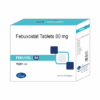- Your cart is empty
- Continue Shopping
Febuvel 40mg Tablet
Febuxostat
₹89.00
Uses of Febuvel 40Tablet
- Treatment of Gout
Add to cart
Buy Now
Introduction Of Febuvel 40mg Tablet
Febuvel 40mg Tablet is a medicine used to treat and prevent gout. Gout happens when there is too much uric acid in your body and it forms into crystals that can appear around your joints leading to painful and swollen joints. This medicine helps to keep uric acid levels low.
Febuvel 40mg Tablet can be taken with or without food. You should keep taking it as recommended by your doctor even when you are not having a gout attack. If you stop, your symptoms may get worse because of the formation of more crystals in your joints. You can help yourself by making some changes to your diet (eg. avoiding alcohol and non-vegetarian foods) and drinking plenty of fluids.Some of the common side effects of this medicine are liver function abnormalities, nausea, joint pain, and rashes. You may experience a temporary increase in the gout symptoms (rapid onset of severe pain, warmth, and redness in the joint) when you first start taking the medicine. However, do not stop taking the medicine. Your doctor may suggest some painkillers and additional medicines to help reduce or prevent these symptoms. Tell your doctor right away if you get any symptoms of liver disease like persistent nausea, dark urine, or yellowing of the eyes or skin.Before taking this medicine, let your doctor know if you have any heart problems, stroke, thyroid problems, or kidney or liver problems. If you are pregnant or breastfeeding, this medicine is best avoided. Check with your doctor. You will need regular blood tests while taking this medicine to check that your liver is working properly.
Febuvel 40mg Tablet can be taken with or without food. You should keep taking it as recommended by your doctor even when you are not having a gout attack. If you stop, your symptoms may get worse because of the formation of more crystals in your joints. You can help yourself by making some changes to your diet (eg. avoiding alcohol and non-vegetarian foods) and drinking plenty of fluids.Some of the common side effects of this medicine are liver function abnormalities, nausea, joint pain, and rashes. You may experience a temporary increase in the gout symptoms (rapid onset of severe pain, warmth, and redness in the joint) when you first start taking the medicine. However, do not stop taking the medicine. Your doctor may suggest some painkillers and additional medicines to help reduce or prevent these symptoms. Tell your doctor right away if you get any symptoms of liver disease like persistent nausea, dark urine, or yellowing of the eyes or skin.Before taking this medicine, let your doctor know if you have any heart problems, stroke, thyroid problems, or kidney or liver problems. If you are pregnant or breastfeeding, this medicine is best avoided. Check with your doctor. You will need regular blood tests while taking this medicine to check that your liver is working properly.
Benefits of Febuvel Tablet
In Treatment of Gout
Febuvel 40mg Tablet is used to prevent and treat gout. Gout is caused by too much uric acid in your body. When the level becomes too high, crystals may form in and around certain joints and your kidneys. This can cause sudden and severe pain, redness, warmth, and swelling. This medicine works by preventing crystals from forming and reducing the levels of uric acid in your blood. This makes it less likely that you will suffer the symptoms and make them milder if you do have them. It is usually for long-term treatment and should be taken regularly until the dose is completed.
Side effects of Febuvel Tablet
Common side effects of Febuvel
- Nausea
- Skin rash
- Abnormal liver function
- Joint pain
- Rash
How to use Febuvel Tablet
Take this medicine in the dose and duration as advised by your doctor. Swallow it as a whole. Do not chew, crush or break it. Febuvel 40mg Tablet may be taken with or without food, but it is better to take it at a fixed time.
How Febuvel Tablet works
Febuvel 40mg Tablet is a xanthine oxidase inhibitor. It works by decreasing blood uric acid, which is the chemical that causes gout.
Safety advice
Alcohol
Unsafe
Caution is advised when consuming alcohol with Febuvel Tablet.
Pregnancy
Consult your doctor
Febuvel 40mg Tablet may be unsafe to use during pregnancy. Although there are limited studies in humans, animal studies have shown harmful effects on the developing baby. Your doctor will weigh the benefits and any potential risks before prescribing it to you.
Breast feeding
Consult your doctor
Febuvel 40mg Tablet is probably unsafe to use during breastfeeding. Limited human data suggests that the drug may pass into the breastmilk and harm the baby.
Driving
Consult your doctor
Febuvel 40mg Tablet may cause side effects which could affect your ability to drive.
Febuvel 40mg Tablet may cause dizziness, sleepiness, blurred vision, numbness or tingling sensation. This may affect your driving ability.
Febuvel 40mg Tablet may cause dizziness, sleepiness, blurred vision, numbness or tingling sensation. This may affect your driving ability.
Kidney
Consult your doctor
Febuvel 40mg Tablet should be used with caution in patients with severe kidney disease. Dose adjustment of Febuvel 40mg Tablet may be needed.
Limited information is available regarding the use of Febuvel 40mg Tablet in these patients.
Limited information is available regarding the use of Febuvel 40mg Tablet in these patients.
Liver
Consult your doctor
Febuvel 40mg Tablet should be used with caution in patients with severe liver disease. Dose adjustment of Febuvel 40mg Tablet may be needed.








Reviews
There are no reviews yet.